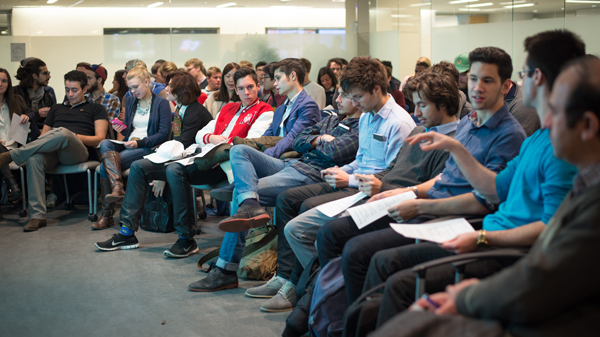
By Chloé Vadot and Asma Manssouri
For the second year in a row, McGill students, graduates, professors and professionals gathered around a series of events as part of McGill Innovation Week.
Fourteen events played out during the first week of November, offering activities both on the McGill campus, as well as in Montreal’s Quartier de l’innovation (QI). For the members of the QI Student Working Group (SWG) at McGill, as well as anyone involved in QI projects, the week’s events presented an opportunity to talk about the neighbourhoods’ ambitions and prospects, such as ways in which McGill strives to be more present in the Quartier, or the potential for students to gain experience in various fields related to innovation and entrepreneurship.
The week opened with remarks by Deputy Provost Ollivier Dyens, celebrating the innovative spirit of students at McGill and the potential for unique collaborations within the university community. During Monday’s panel on enriching student experiences in the QI, which featured McGill professors Michael Jemtrud and Anita Nowak, as well as students Mark Ramsay Elsworthy and Chloé Vadot, the discussion explored the effect of experiential learning opportunities and research projects in the QI. Nowak discussed the meaning of social innovation in Quebec, and the ability of universities like McGill to stand out in their contributions to organizations and start-ups in the cities that surround them, through programs like Desautels’ SEI Impact Internship Program. Asked to define innovation, Elsworthy subscribed to the idea that innovation is about “taking the normal path and bending it.”
On Tuesday, McGill alum Natalie Voland and Will Straw, Director of the McGill Institute for the Study of Canada, discussed the serendipitous nature of innovation at the Saint-Joseph Church, soon to be repurposed as Salon 1861.
Organized by members of the SWG, McGill’s first Innovation Fair, which took place on Wednesday, regrouped a variety of student initiatives, including student clubs like McGill Robotics, McGill Spaces Project, and ÉTS’s DécliQ, as well start-up organizations like the Bloom Initiative, Kreate, and Art Bang Bang. The day brought many discoveries for the McGill community, inspiring new collaborations between student groups, who also received a lot of constructive feedback from visitors.
Later in the day, the Institute for the Study of International Development and the Mosaic Institute welcomed Kathleen Felix and James Féthière to discuss Bridging Innovation: A Look at Global Health, Development and Diaspora Engagement in Haiti. Standpoints, a non-profit student association, coordinated a talk on innovation in the art world, inviting pioneers as well as young professionals to discuss together.
Thursday was dedicated to the fourth edition of the Montreal Summit on Innovation (MSI). Attended by about 475 people, the annual event focused on the connection between health and creative industries. From IBM’s Watson, an impressive computer designed to save doctors considerable time by generating rapid evaluation from disparate data, to original undertakings such as that of SAMS, an association that aims to bring the Place des Arts to hospitals by organizing concerts for patients, the MSI offered a very diverse and original array of emerging solutions to health-related issues. The innovations touched on technology, video games, wearables and art. In the meantime, eight teams of designers participated in the Hacking Health Design challenge, presented by Francis Gosselin (f. & co) and Luc Sirois (Hacking Health Canada), working throughout the day on projects to answer the challenges raised at the Summit.
The last day of MIW 2014 opened with a storytelling discussion panel featuring Lucinda Chodan, editor in chief at the Montreal Gazette, and the dynamic founders of Heart City Apparel, McGill graduate Matt Dajer and student D’Arcy Williams: two generations had the opportunity to exchange their views on the meaning of innovation and ways by which it is triggered. Louis-Félix Binette, general director and cofounder of f. & co, ended the talk with a mind-blowing speech, discussing the necessity and strategies to challenge current institutions.
To complete the week, Professor Nii Addy opened his Social Context of Business course to a wider audience, in collaboration with the McGill Centre for the Convergence of Health and Economics (MCCHE) and the QI team gave a three-hour walking tour of the QI district with students and staff.
This year, McGill Innovation Week reached more than 1,200 individuals, demonstrating the interest of students and professors on campus, as well as Montreal professionals in the field, to hold dialogues around the topics of innovation, entrepreneurship, and experiential learning. The week’s events strengthened existing partnerships in the community, and created new links for future collaborations.
